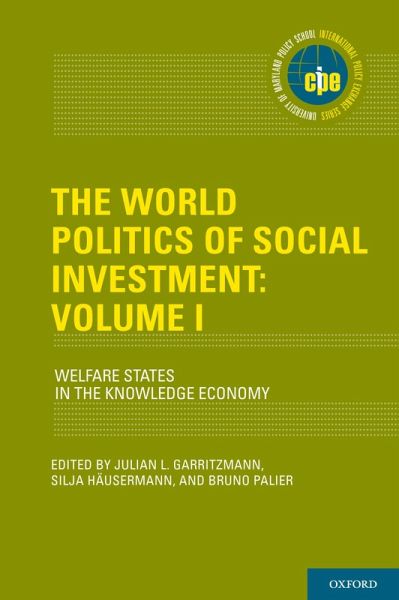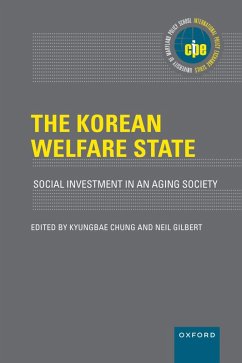
The World Politics of Social Investment: Volume I (eBook, ePUB)
Welfare States in the Knowledge Economy
Redaktion: Garritzmann, Julian L.; Palier, Bruno; Häusermann, Silja
Versandkostenfrei!
Sofort per Download lieferbar
30,95 €
inkl. MwSt.
Weitere Ausgaben:

PAYBACK Punkte
15 °P sammeln!
Welfare states around the globe are changing, challenged by the development of knowledge economies. In many countries, policy-makers' main response has been to modernize welfare states by focusing on future-oriented social investment policies that focus on creating, mobilizing, and preserving human skills and capabilities. Yet, there is massive variance in the development of social investment strategies. The World Politics of Social Investment: Welfare States in the 21st Century is the first of two volumes of the World Politics of Social Investment (WOPSI) project, which systematically maps an...
Welfare states around the globe are changing, challenged by the development of knowledge economies. In many countries, policy-makers' main response has been to modernize welfare states by focusing on future-oriented social investment policies that focus on creating, mobilizing, and preserving human skills and capabilities. Yet, there is massive variance in the development of social investment strategies. The World Politics of Social Investment: Welfare States in the 21st Century is the first of two volumes of the World Politics of Social Investment (WOPSI) project, which systematically maps and explains different welfare reform strategies in democratic countries around the world. This volume develops a theory on the political and socio-economic conditions for the development of social investment policies around the globe, and studies the impact of the main explanatory factors on the empirical variety of social investment reforms (and non-social investment reforms). It also proposes a new typology of different welfare reform strategies, distinguishing nine types of social investment strategies depending on their functions (creating, mobilizing and preserving human skill and capabilities) and their distributive profiles (inclusive, stratified or targeted), and three types of non-social investment welfare strategies (market liberalism, social protectionism and basic income). The chapters of this volume are written by leading social policy scholars from different disciplines and countries, who apply the WOPSI global theoretical framework in a range of contexts and policy fields, shedding light on the scope conditions of social investment, as well as political demand- and supply-side drivers of social investment reforms. This volume on its own or in conjunction with the second volume is an invaluable resource on the state of modern welfare and social investment policies from around the globe.
Dieser Download kann aus rechtlichen Gründen nur mit Rechnungsadresse in A, B, BG, CY, CZ, D, DK, EW, E, FIN, F, GR, HR, H, IRL, I, LT, L, LR, M, NL, PL, P, R, S, SLO, SK ausgeliefert werden.













